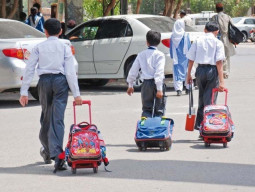
Lack of access to a clean and private toilet can expose individuals to the risk of disease. But the taboo attached to ‘toilet talk’ is the biggest hurdle in addressing sanitation issues to decrease the prevalence of diseases such as malaria, diarrhoea, cholera, typhoid and tuberculosis, which annually kill over 40,000 children in Pakistan alone.
These statistics were shared during a seminar on World Toilet Day held at the National Library on Monday. The seminar aimed to raise awareness on the issues pertaining to sanitation while eliminating the taboo attached to the topic.
“It is important to instil in children the awareness that it is okay to talk about defecation and know the importance of sanitation, especially as children are most receptive to new information,” said WaterAid-Pakistan National Coordinator Aisha Javed.
Almost 400 schoolchildren from around the twin cities were invited to take part in a model building, speech and poster competition on sanitation. For the model competition, first prize went to Farzeen Mehmood, Sara Nayyer, Harosa Waheed of Behbud Model High School Rawalpindi. The first prize for the poster competition went to Areeba Omar from Bright Land Secondary School, and Muhammed Osaf from Allama Iqbal Mission High School, Rawalpindi won the speech contest and impressed judges with his confidence and articulate speech on how diseases spread through faulty sanitation methods and open defection.
Ministry of Climate Change Director General Jawed Ali Khan noted that Pakistan’s efforts for polio eradication and achieving sustainable development goals are bound to fail if access to safe sanitation in the country is not improved.
Simone Klawitter, UNICEF country representative for Water, Sanitation and Hygiene, said that Pakistan has committed to providing 64% of Pakistanis with adequate sanitation by the Millennium Development Goals (MDGs) of 2015. However, only 45% people use improved sanitation facilities in the region right now, he added.
Head of the Pakistan Institute for Environment Development Action Research Syed Ayub Qutub noted how lack of toilet facilities affect women as they risk shame and even harassment. “Women and older girls find it particularly inconvenient, often having to wait for the relative privacy of the night to defecate in the open,” he added.
According to WaterAid’s statistics, one in three women worldwide risks shame, disease, harassment and even attack as she has nowhere safe to go to the toilet, and this figure is largely found in developing nations. Proper sanitation would make 1.25 billion women’s lives safer and healthier.
About Pakistan’s sanitation status in particular, Qutub said that only two-thirds of households have access to flush toilets, either cistern or pour-flush.
Another 15% have non-flush toilets, while 18% of the households have no toilets at all. In the rural areas of the country, 27% of the households have no toilets, that is, about 35 million people go out to defecate daily.
The seminar concluded that Pakistan will not be able to achieve its MDGs for 2015 without proper sanitation and water management, as every day more lives are lost to easily preventable diseases.
The seminar was organised by Ministry of Climate Change in collaboration with UNICEF, WaterAid- Pakistan and PIEDAR.
Published in The Express Tribune, November 20th, 2012.
COMMENTS (4)
Comments are moderated and generally will be posted if they are on-topic and not abusive.
For more information, please see our Comments FAQ



































1714129906-0/Clint-Eastwood-(1)1714129906-0-270x192.webp)






Thanks to ET for taking the real issues of Pakistan up. Otherwise each time the real issue for ET is Malala, Rimsha, Blasphemy, shaism, communism, liberalism etc which are not the real issues of Pakistan. The real issues of Pakistan are food, shelter, education, clean drinking water, sanitation, hygiene and health.
these are the things which one should look for in the news, but most prefer to waste their time on useless things, and news like these fall on deaf years. people talk about drone strikes day and night, but most are even unaware of the fact that 40,000 kids die in Pakistan due to basic lack of sanitation.
next time when you go to streets, demand increased funding for better sanitation,the drones strikes will stop, but, if the action is not taken, the number of children dying due to lack of sanitation will continue to rise year by year,get your priorities right. No Pakistani leader has the knowledge of what truly is plaguing Pakistan's economic prosperity and stability.
efforts should be made to address this serious matter, most of the people in rural areas never care about hygiene they even don't know what hygiene is. proper awareness programs should be started on basic information about health and hygiene and how to use toilet.
taboo attached to ‘toilet talk’ is the biggest hurdle in addressing sanitation issues
talking about India's toilets is no taboo for Pakistanis.